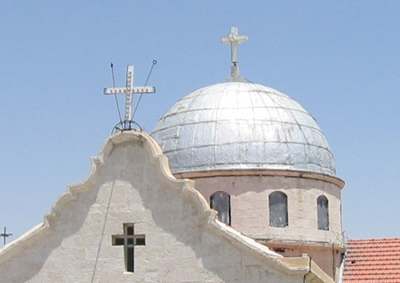
DAVID ADAMS looks at a new report on the positive impact of Christian communities in Iraq and Syria despite the ongoing conflict…
Christians in Syria and Iraq continue to impact their societies in a range of positive ways despite the severe pressure and increasing marginalisation faced by the church in the Middle East, according to a new report.
Compiled by Christian organisations Open Doors, Served and Middle East Concern as well as the University of East London, the Hope for the Middle East report says while many Christians have left Syria and Iraq in recent years, those who remain continue to make contributions to Iraqi and Syrian societies in a range of fields including education, medicine, science and engineering.
 |
|
CHRISTIAN PRESENCE: Part of a church in Syria. PICTURE: www.freeimages.com “Christians are widely acclaimed for their values, relative integrity, and commitment to excellence. These traits, and the intellectual discourse that many Christians promote, are an important counter-influence to extremist tendencies that are growing in both countries.”– Hope for the Middle East report |
It concludes that while Christians are perhaps best known for their contributions in providing quality education and engagement in social and political discourse, they are also highly active in social service and humanitarian aid provision, noting that as the needs have grown in their countries, so too has their contribution.
The report also found that Christians have influential international networks, which while they have helped them emigrate, have also helped facilitate trade, international aid and interfaith dialogue. Christians, it says, are “widely acclaimed for their values, relative integrity and commitment to excellence”.
Pointing out that as many as 50 per cent of the up to 2.2 million Christians who lived in Syria in 2011 have since left and as many as 85 per cent of the Christian population in Iraq have left since 2003, it says that should their numbers further decrease in the region, their loss would be “severely felt”.
The report, which is based on academic and news sources as well as 24 interviews, estimates that the Christian population of Syria, where they have had “relative freedom of worship”, now stands at 40 to 50 per cent of the approximately two million who there prior to 2011. They identify with 11 officially recognised Christian groups, “most of whom self-identify as Arab or Arabic-speaking, and consider Syria their spiritual home”.
In Iraq, meanwhile, where the Christian presence dates back to the 3rd century, the population is now estimated to number between 200,000 to 500,000. About 70 per cent are from the Chaldean Catholic tradition while the remainder as Syriac, Orthodox, Syriac Catholic, Armenian and Protestant.
The report said that while many Syrian and Iraqi Christians still there are committed to remaining in their home countries, they continue to face pressure and risks from multiple sources. In Syria, it says “the few Christians who still live in areas under the control of the so-called Islamic State or other Islamic groups often have to agree to pay a jizya tax, an Islamic religious tax imposed on non-Muslims, and face a variety of other restrictions to church buildings and to engaging in religious activities.”
It says that in these areas, “many Christians have fled or are fleeing; those who remain have become extremely vulnerable, with their churches, homes, businesses and very lives at times targeted.”
In Syria more broadly, the report says that Christians are seen by some Muslims as “encouraging secular and liberal thinking”.
“(S)ome respondents argued that the high representation of Christians in the arts and intellectual circles may be attributed to the relatively liberal education enjoyed by many Christians,” it says. “Many fear, therefore, that the loss of a Christian influence in Syria could open a greater space for extremism.”
In Iraq, meanwhile, while there have in the past been some divisions between churches, the division is said to be “weakening” thanks to the need for churches to work together in providing humanitarian aid. It says that some of the most effective and respected aid providers in Iraq are Christian organisations, noting that churches are “most visibly active” in this area in the Kurdish-administered region of Northern Iraq althought they have engaged in aid provision throughout the country.






